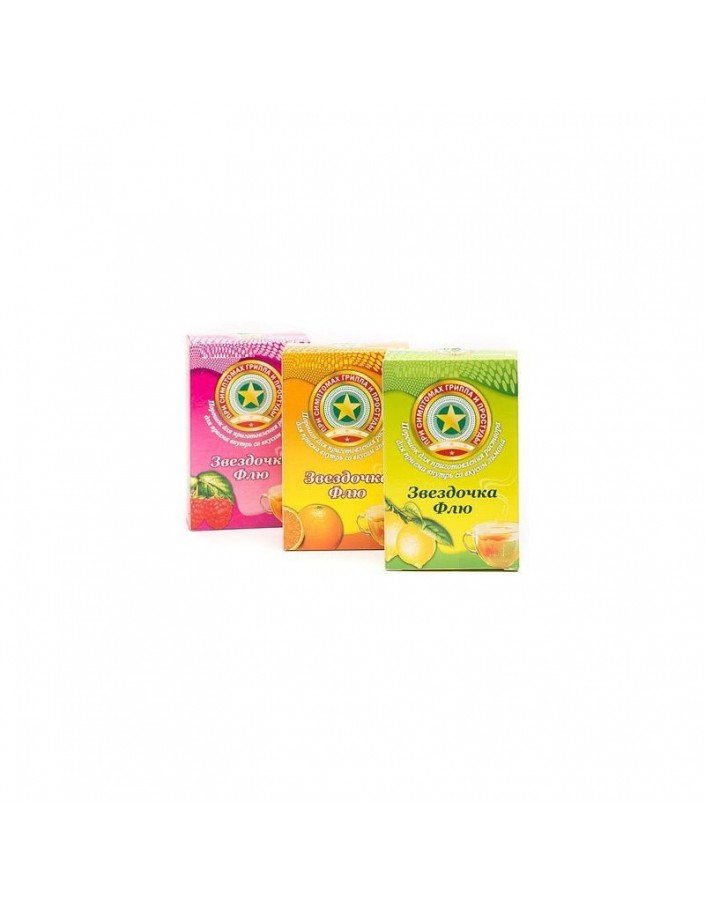




Security policy (edit with Customer reassurance module)

Delivery policy (edit with Customer reassurance module)

Return policy (edit with Customer reassurance module)
- symptomatic treatment of “colds”, ARVI, incl. influenza (febrile syndrome, pain syndrome, rhinorrhea).
Inside
Dissolve the contents of one sachet in 1 cup of boiled hot water. Consume hot. You can add sugar to taste. Repeated dose can be taken every 4 hours (no more than 4 doses within 24 hours).
Flew Star can be used at any time of the day. If relief of symptoms is not observed within 3 days after the start of the drug administration, it is necessary to consult a doctor.
Allergic reactions (skin rash, itching, urticaria, angioedema), nausea, epigastric pain; anemia, thrombocytopenia, agranulocytosis. Increased irritability, dizziness, increased blood pressure, violation of sleep. Mydriasis, accommodation paresis, increased intraocular pressure, dry mouth; urine retention.
With prolonged use in large doses - hepatotoxic effect, hemolytic anemia, aplastic anemia, methemoglobinemia, pancytopenia; nephrotoxicity (renal colic, glycosuria, interstitial nephritis, papillary necrosis).
- hypersensitivity;
- children's age up to 12 years;
- phenylketonuria;
- diabetes;
- portal hypertension;
- alcoholism;
- renal failure;
- pregnancy;
- lactation period;
- deficiency of glucose-6-phosphate dehydrogenase;
- while taking tricyclic antidepressants, monoamine oxidase inhibitors (MAO), beta-blockers.
Carefully
Congenital hyperbilirubinemia (Gilbert, Dubin-Johnson and Rotor syndromes), children up to 15 years, angle-closure glaucoma, prostatic hyperplasia, pronounced atherosclerosis of the coronary arteries, arterial hypertension, hepatic and / or renal failure, pheochromocytoma.
Use during pregnancy and lactation
Contraindicated in pregnancy and lactation.
Application for violations of the liver
Use with caution in liver failure.
Application for violations of kidney function
Contraindicated in renal failure.
Contraindicated in children under 12 years.
During treatment, it is necessary to refrain from the use of ethanol (possibly the development of a hepatotoxic action).
Influence on ability to drive motor transport and control mechanisms
It is necessary to refrain from driving vehicles and engaging in other potentially hazardous activities that require increased concentration and psychomotor speed.
Symptoms (caused by paracetamol): pallor of the skin, loss of appetite, nausea, vomiting; hepatonecrosis (severity of necrosis due to intoxication directly depends on the degree of overdose).Toxic effect in adults is possible after taking more than 10-15 g of Paracetamol : an increase in the activity of liver transaminases,
an increase in prothrombin time (12-48 hours after administration); A detailed clinical picture of liver damage occurs after 1-6 days. Rarely, liver failure develops with lightning speed and may be complicated by renal failure (tubular necrosis).
Treatment: the introduction of SH-group donators and precursors of the synthesis of glutathione - methionine 8–9 hours after overdose and N-acetylcysteine 12 hours later.
The need for additional therapeutic measures (the further introduction of methionine, in / in the introduction of N-acetylcysteine) is determined depending on the concentration of paracetamol in the blood, as well as the time elapsed after taking it.
Enhances the effects of MAO inhibitors, sedative drugs, ethanol.
Ethanol enhances the sedative effect of pheniramine, which is part of the drug.
Pheniramine concurrently with MAO inhibitors, furazolidone can lead to hypertensive crisis, agitation, hyperpyrexia.
Antidepressants, anti-parkinsonian and antipsychotic drugs, phenothiazine derivatives increase the risk of urinary retention, dry mouth, and constipation.
Glucocorticosteroids (GCS) increase the risk of developing an increase in intraocular pressure.
Paracetamol reduces the effectiveness of uricosuric drugs and increases the effectiveness of indirect anticoagulants.
Tricyclic antidepressants increase the sympathomimetic effect, the simultaneous appointment of halothane increases the risk of ventricular arrhythmias.
Reduces the hypotensive effect of guanethidine, which in turn enhances the alpha-adrenostimulatory activity of phenylephrine.
Pharmacy sales terms
Over the counter.
Terms and conditions of storage
In a dry, dark place at a temperature of from 15 to 25 ° C. Keep out of reach of children.